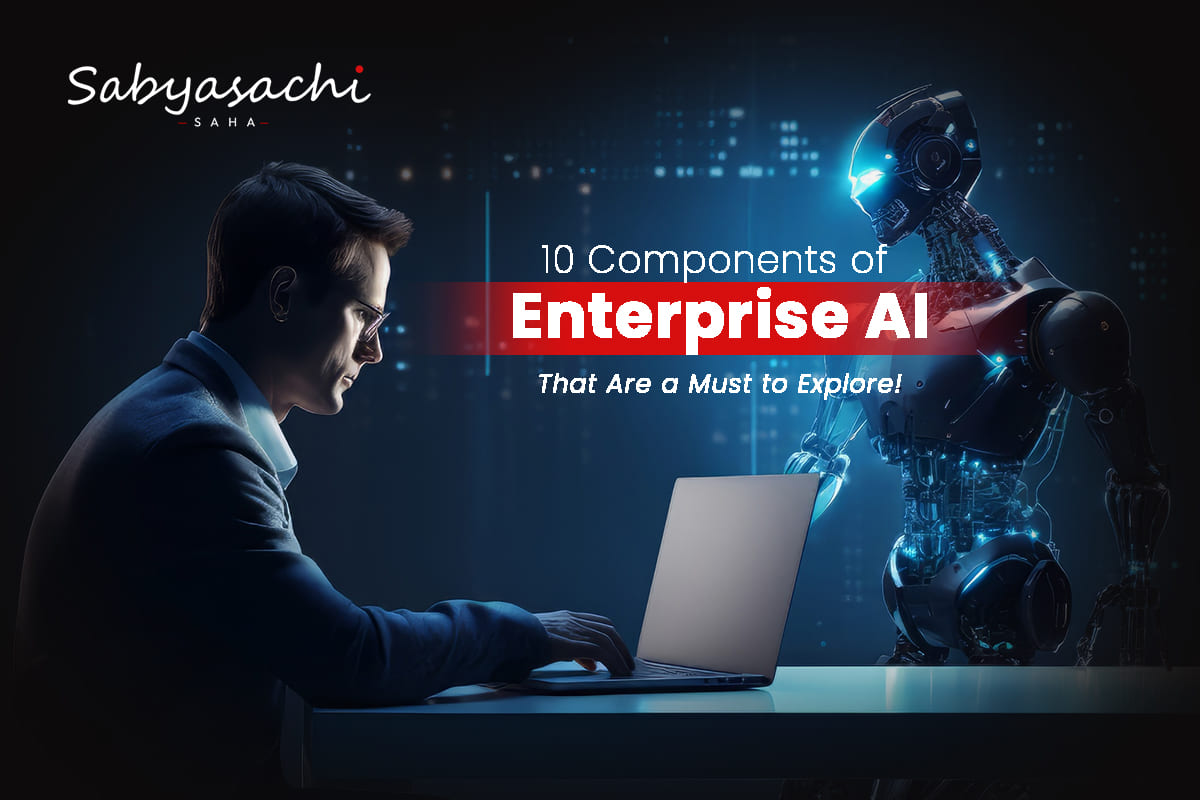Imagine effortlessly handling massive traffic, utilizing cognitive technologies, and ensuring ironclad data security. Custom-made AI capabilities not only streamline operations but also decode customer behavior, empowering you to offer irresistible products promptly. Don’t risk falling behind – embrace Enterprise AI to stay ahead, exploring its vital components that ensure your business thrives in the dynamic landscape.
Key Differences between Regular AI and Enterprise AI:
| Aspect | Regular AI | Enterprise AI |
| Scope | General challenges, broad applications | Business-specific challenges, optimized operations |
| Purpose | Overcome general challenges | Address business challenges, enhance efficiency |
| Data Sources | Public and academic data | Internal data, customer info, industry datasets |
| Personalization | Lacks customization | Tailored for specific business needs |
| Deployment | General applications | Strategic deployment for internal processes |
| Scalability | Not a primary concern | Requires scalability for large datasets |
| ROI & Value | Focus on engagement, revenue | Cost reduction, revenue increase, competitiveness |
| Regulations & Ethics | Varies by vertical | Strict adherence to privacy and industry regulations |
| Integration | Limited emphasis on integrations | Requires seamless integration with existing systems |
| Data Governance | Lacks rigorous data governance | Strict data governance for quality and compliance |
| Use Cases | Chatbots, recommender systems | Demand prediction, fraud detection, customer support, supply chain optimization |
| Risk Impact | Individual impact | Broader organizational implications |
Discover the 10 must-explore components shaping the future of Enterprise AI:
Why does Enterprise AI stand as a strategic powerhouse? It’s because it revolutionizes organizational operations through the integration of artificial intelligence technologies. This transformative approach not only streamlines business processes but also accelerates decision-making, boosts productivity, and impacts both top and bottom lines. In this guide, you will get to know the crucial components that constitute a robust Enterprise AI framework.
- Data Infrastructure:
At the heart of effective artificial intelligence lies comprehensive data utilization. Whether sourced from customer interactions, operational processes, or external channels, structured and unstructured data is paramount. To harness its potential, a resilient data infrastructure is essential. Leveraging data warehouses, whether on-premise or in the cloud, ensures seamless storage, management, and processing of valuable data.
- Machine Learning & Deep Learning:
Machine learning is the backbone of systems that continually enhance performance through data-driven learning. Algorithms such as regression, decision trees, and neural networks empower software to interpret and learn from data. Deep learning, a subset of AI employing neural networks, excels in tasks like image classification, natural language processing, and speech recognition.
- Natural Language Processing (NLP):
Facilitating swift interactions between humans and machines, NLP is a vital sub-field of AI. Enabling machines to understand and interpret human language, NLP is instrumental in the development of enterprise AI chatbot solutions, fostering effective communication within organizations.
- Robotics & Automation:
The integration of software robots and robotic process automation (RPA) tools eliminates mundane and time-consuming tasks. This results in error reduction, streamlined workflows, and heightened efficiency in areas such as finance, supply chain, and customer support.
- Computer Vision:
Crucial in interpreting visual information from images or videos, computer vision is a key AI subtype. Its applications span quality control, surveillance, and image recognition, particularly benefiting the manufacturing industry.
- Cognitive Computing:
Stimulating human thought processes through AI, cognitive computing excels in understanding unstructured data. It facilitates interactive learning and interpretation, significantly contributing to fields like diagnosis and legal research.
- Predictive Analytics:
A cornerstone of AI, predictive analytics enables the forecasting of future demand, trends, outcomes, and events. Its relevance extends to enterprise decision-making, customer churn forecasting, and risk management.
- Cloud Computing & Edge AI:
For scalability and accessibility, cloud computing is paramount, with many organizations heavily investing in cloud platforms. Simultaneously, Edge AI executes AI algorithms on local devices and edge servers, enabling real-time processing for applications like autonomous vehicles.
- Decision Support Systems:
AI-backed decision support systems have proven instrumental in supply chain management, strategic planning, and resource allocation, contributing significantly to informed decision-making processes.
- Ethical Considerations:
Ensuring ethical AI practices, data privacy, and regulatory compliance is integral to Enterprise AI. Establishing governance frameworks is imperative to oversee AI implementations, mitigating the risk of discrimination.
The future growth of businesses will be propelled by the seamless integration of Enterprise AI, enabling organizations to harness vast amounts of data for insightful decision-making. With predictive analytics, automation, and personalized customer experiences, Enterprise AI will pave the way for unprecedented efficiency, innovation, and sustainable growth in the evolving business landscape. Embracing these key components, your organization can utilize the full potential of Enterprise AI for sure, ushering in a new era of efficiency, innovation, and strategic decision-making.


